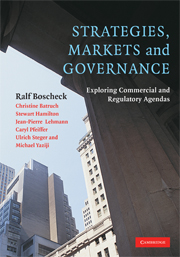Book contents
- Frontmatter
- Contents
- List of Figures, Boxes and Tables
- Acknowledgments
- Preface
- Notes on Contributors
- Part I Introduction and overview
- Part II Firm-level
- 2 Competitive advantage and the regulation of dominant firms
- 3 Delegating regulation: Supply-chain management, partnering and competition policy reforms
- 4 Diffusion of corporate governance regulation: France, Germany, the UK and the USA
- 5 Corporate governance after Enron et al.
- 6 Tackling healthcare fraud!?
- 7 Watchdog and proxy war campaigns against firms
- 8 Oil and conflict: Lundin Petroleum's experience in Sudan
- Part III Industry-level
- Part IV Country/International level
- Part V An observation in closing
- Index
3 - Delegating regulation: Supply-chain management, partnering and competition policy reforms
Published online by Cambridge University Press: 06 July 2010
- Frontmatter
- Contents
- List of Figures, Boxes and Tables
- Acknowledgments
- Preface
- Notes on Contributors
- Part I Introduction and overview
- Part II Firm-level
- 2 Competitive advantage and the regulation of dominant firms
- 3 Delegating regulation: Supply-chain management, partnering and competition policy reforms
- 4 Diffusion of corporate governance regulation: France, Germany, the UK and the USA
- 5 Corporate governance after Enron et al.
- 6 Tackling healthcare fraud!?
- 7 Watchdog and proxy war campaigns against firms
- 8 Oil and conflict: Lundin Petroleum's experience in Sudan
- Part III Industry-level
- Part IV Country/International level
- Part V An observation in closing
- Index
Summary
Accompanying the enlargement of the European Union (EU) on May 1, 2004, the Commission ushered in a complete overhaul of the procedural rules applicable to Articles 81 and 82 of the EC Treaty. As a result, the EU's competition law regime shifted from a highly centralized notification and authorization process to a decentralized system that is to rely more broadly on national competition authorities (NCAs), courts and undertakings themselves for case assessment and law enforcement. By delegating regulatory tasks, the Commission hopes to free resources for the proactive appraisal of key cases and new policy areas and to ensure the uniform application of EU Competition Law through economic, “effect-based” substantive rules, procedural guidance and outcome controls. But while the lack of economic references makes stipulating substantive and procedural standards far from trivial, specifying these still does not guarantee effective regulatory delegation at Member State and corporate level.
This chapter addresses four aspects of the modernization of EU competition policy: Section 1 sketches the challenges of devising welfare economic default rules for assessing and prejudging company behavior; Section 2 illustrates these with reference to currently the most demanding area of antitrust – vertical restraints; Section 3 appraises the “EU block exemption regulation for vertical restraints” in the context of broader EU competition policy reform. Section 4 discusses preconditions that allow delegated regulation to be effective and reliable.
- Type
- Chapter
- Information
- Strategies, Markets and GovernanceExploring Commercial and Regulatory Agendas, pp. 52 - 68Publisher: Cambridge University PressPrint publication year: 2008



